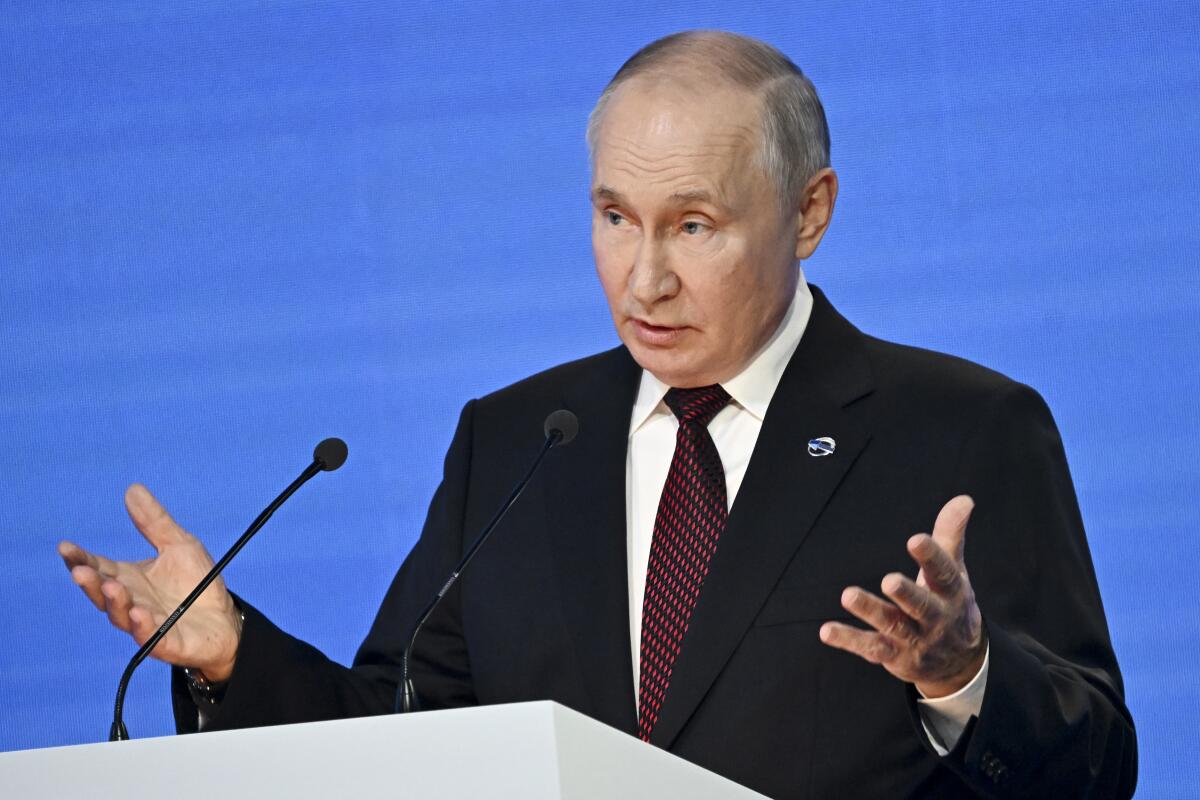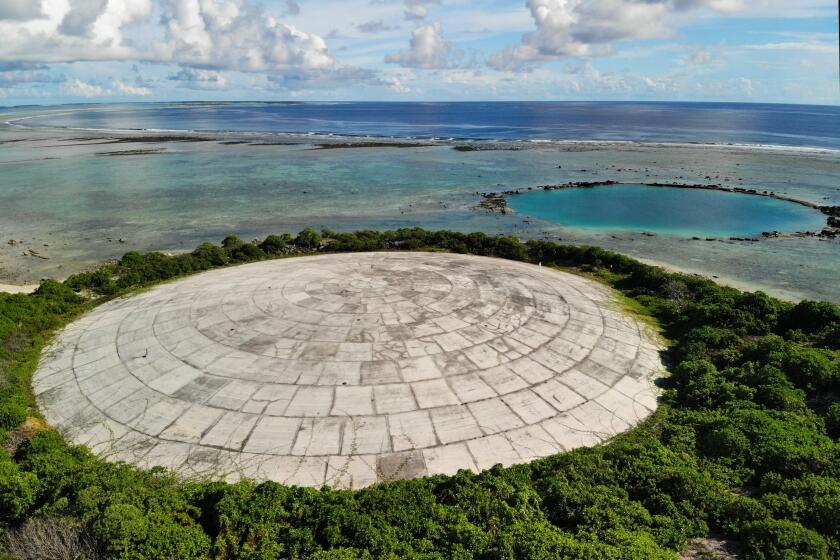Russia tests nuclear-powered missile, could revoke global atomic test ban, Putin says

MOSCOW — Russia has successfully tested an experimental nuclear-powered cruise missile, President Vladimir Putin said Thursday, while also warning that the country’s parliament could revoke its ratification of a treaty banning nuclear tests.
In a speech at a forum of foreign policy experts, Putin announced that Russia has effectively completed the development of the Burevestnik cruise missile and the Sarmat heavy intercontinental ballistic missile and will work on putting them into production.
“We conducted the last successful test of the Burevestnik nuclear-powered global-range cruise missile,” he said without elaborating. His statement was the first announcement of a successful test of the Burevestnik, which translates as “Storm Petrel.” It was first mentioned by Putin in 2018.
Little is known about the Burevestnik, which was code-named Skyfall by NATO, and many Western experts have been skeptical about it, noting that a nuclear engine could be highly unreliable.
Congress is demanding the Department of Energy investigate an aging, cracking U.S. nuclear waste dump in the Marshall Islands, the focus of a Los Angeles Times investigation this year.
It is believed to be able to carry a nuclear warhead or a conventional one, and potentially could stay aloft for a much longer time than other missiles and cover much more distance, thanks to nuclear propulsion.
When Putin first revealed that Russia was working on the weapon in his 2018 state-of-the-nation address, he claimed it would have an unlimited range, allowing it to circle the globe undetected by missile defense systems.
Many observers have remained skeptical, arguing such a weapon could be difficult to handle and pose an environmental threat. The U.S. and the Soviet Union worked on nuclear-powered rocket engines during the Cold War, but they eventually shelved the projects, considering them too hazardous.
The Burevestnik reportedly experienced an explosion in August 2019 during tests at a Russian navy range on the White Sea, killing five nuclear engineers and two servicemen and resulting in a brief spike in radioactivity that fueled fears in a nearby city.
Russian officials never identified the weapon involved, but the U.S. said it was the Burevestnik.
Russia has reportedly used the Arctic Novaya Zemlya archipelago where the Soviet Union last tested a nuclear weapon to build facilities for testing the Burevestnik.
Weapons: President will make ratification a priority this year, aides say. But key Senate Republicans are opposed.
In the speech, Putin noted the United States has signed but not ratified the 1996 Comprehensive Nuclear Test Ban, while Russia has signed and ratified it. He argued that Russia could “mirror the stand taken by the U.S.”
“Theoretically, we may revoke the ratification,” he said.
Putin’s statement comes amid widespread concerns that Russia could move to resume nuclear tests to try to discourage the West from continuing to offer military support to Ukraine after the Kremlin sent troops into the country. Many Russian hawks have spoken in favor of resuming the tests.
Putin said that while some experts have talked about the need to conduct nuclear tests, he hasn’t yet formed an opinion on the issue.
“I’m not ready to say yet whether it’s necessary for us to conduct tests or not,” he said.
The Soviet Union on Wednesday announced a moratorium on nuclear weapons testing to take effect Aug. 6, the 40th anniversary of the atomic bombing of Hiroshima, but the private statement delivered to a U.S. arms control lobbying group suggested that the ban will be canceled unless the United States follows suit.
Russia’s defense doctrine envisages a nuclear response to an atomic strike or even an attack with conventional weapons that “threaten the very existence of the Russian state.” That vague wording has led some Russian experts to urge the Kremlin to sharpen it, in order to force the West to take the warnings more seriously.
One of them, Sergei Karaganov, a top Russian foreign affairs expert who advises Putin’s Security Council, has argued that Moscow should ramp up its nuclear threats to “break the will of the West” or even launch a limited nuclear strike on NATO allies in Europe if the West fails to stop supporting Ukraine.
Responding Wednesday to Karaganov’s question about possible changes in the Russian nuclear doctrine, Putin responded that he doesn’t see any reason for that.
“There is no situation in which anything would threaten Russian statehood and the existence of the Russian state,” he said. “I think that no person of sober mind and clear memory could have an idea to use nuclear weapons against Russia.”
More to Read
Sign up for Essential California
The most important California stories and recommendations in your inbox every morning.
You may occasionally receive promotional content from the Los Angeles Times.











